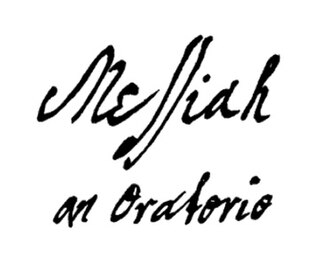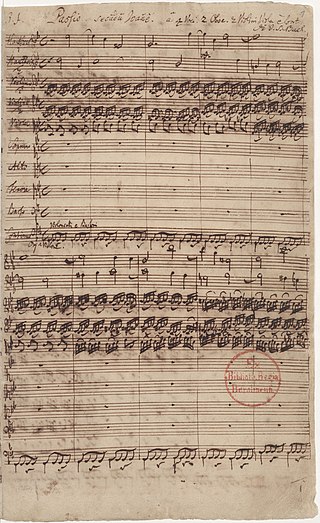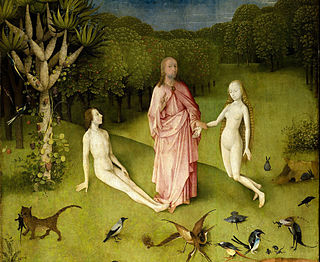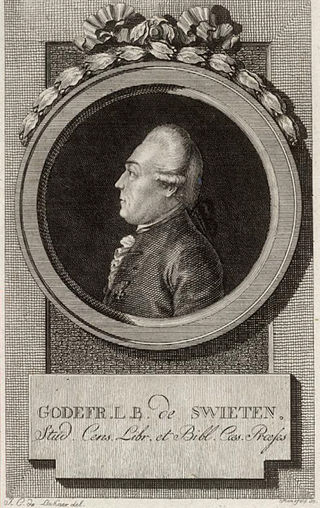Michael Marissen (born July 31, 1960 in Hamilton, Ontario) is a Canadian professor of music at Swarthmore College, where he joined the faculty in 1989.
Michael Marissen (born July 31, 1960 in Hamilton, Ontario) is a Canadian professor of music at Swarthmore College, where he joined the faculty in 1989.
Marissen studied music history at Calvin College and received his PhD from Brandeis University.
As well as his work as a professor of music at Swarthmore College, he has guest taught on the graduate faculty at Princeton University and the University of Pennsylvania. In June 2014 Marissen announced that he had retired from active teaching at Swarthmore, although he remains a professor emeritus. He now works as a freelance writer, lecturer, [1] and scholar.
Marissen's books, centered on the issue of music and religion, include The Social and Religious Designs of J. S. Bach's Brandenburg Concertos (Princeton, 1995), Lutheranism, Anti-Judaism, and Bach's St. John Passion: With an Annotated Literal Translation of the Libretto (Oxford, 1998), An Introduction to Bach Studies (Oxford, 1998) with Daniel R. Melamed, and Bach's Oratorios: The Parallel German-English Texts with Annotations (Oxford, 2008), and Bach & God (Oxford 2016).
Marissen's most controversial work began as an essay published in The New York Times on Easter Sunday, April 8, 2007, entitled “Unsettling History of That Joyous ‘Hallelujah’", which is the basis for his recently published monograph entitled, Tainted Glory in Handel's Messiah: The Unsettling History of the World's Most Beloved Choral Work (Yale University Press, 2014). The first half of the book outlines his thesis that Handel and his librettist showed an unattractive and morally questionable anti-Judaism that manifested itself in "triumphalism," a caustic celebration of the defeat of the Jews at the hands of the Romans (in AD 70, with the siege of Jerusalem and the destruction of the Second Temple). The second half of the book contains an annotated libretto of "The Messiah," illuminating the many often obscure passages that rely on an extensive understanding of typology as a technique for understanding Christianity and the New Testament.
The article received a long series of spirited responses, including a follow-up news story in the Times, many letters to the editor, follow-up responses in a wide variety of publications [2] [3] [4] (including from Watergate-figure Chuck Colson [5] and from the religion author Martin E. Marty), along with extensive blog and internet newsgroup discussions.
His 2016 work, Bach and God, explored the religious character of Bach's vocal and instrumental music in seven interrelated essays. Making careful biblical and theological scrutiny of the librettos, he also shows how Bach's pitches, rhythms, and tone colors can create meaning that goes beyond setting texts in an aesthetically satisfying manner. In some of Bach's vocal repertory, the music uses his "learned counterpoint [to] powerfully project certain elements of traditional Lutheran theology.” The author also explores how Bach “took up anti-Judaism” in several cantatas while seeming to intentionally avoid or minimize the potential for anti-Jewish sentiment in his Passion settings.
In May 2016, Michael Marissen and his wife, author Lauren Belfer, were profiled in an article in The New York Times. In the article, they discuss their working process, Bach, and writing a novel with musical accuracy. [6]
His younger brother is Mark Marissen, a prominent political strategist for the Liberal Party of British Columbia and the Liberal Party of Canada.

George FridericHandel was a German-British Baroque composer well known for his operas, oratorios, anthems, concerti grossi, and organ concertos. Handel received his training in Halle and worked as a composer in Hamburg and Italy before settling in London in 1712, where he spent the bulk of his career and became a naturalised British subject in 1727. He was strongly influenced both by the middle-German polyphonic choral tradition and by composers of the Italian Baroque. In turn, Handel's music forms one of the peaks of the "high baroque" style, bringing Italian opera to its highest development, creating the genres of English oratorio and organ concerto, and introducing a new style into English church music. He is consistently recognized as one of the greatest composers of his age.
An oratorio is a musical composition with dramatic or narrative text for choir, soloists and orchestra or other ensemble.

Messiah is an English-language oratorio composed in 1741 by George Frideric Handel. The text was compiled from the King James Bible and the Coverdale Psalter by Charles Jennens. It was first performed in Dublin on 13 April 1742 and received its London premiere a year later. After an initially modest public reception, the oratorio gained in popularity, eventually becoming one of the best-known and most frequently performed choral works in Western music.
Karl Richter was a German conductor, choirmaster, organist, and harpsichordist.

Trevor David Pinnock is a British harpsichordist and conductor.

Samson is a three-act oratorio by George Frideric Handel, considered to be one of his finest dramatic works. It is usually performed as an oratorio in concert form, but on occasions has also been staged as an opera. The well-known arias "Let the bright Seraphim", "Total eclipse" and "Let their celestial concerts" are often performed separately in concert.
The English Concert is a baroque orchestra playing on period instruments based in London. Founded in 1972 and directed from the harpsichord by Trevor Pinnock for 30 years, it is now directed by harpsichordist Harry Bicket. Nadja Zwiener has been orchestra leader (concertmaster) since September 2007.

Masaaki Suzuki is a Japanese organist, harpsichordist, conductor, and the founder and music director of the Bach Collegium Japan. With this ensemble he is recording the complete choral works of Johann Sebastian Bach for the Swedish label BIS Records, for which he is also recording Bach's concertos, orchestral suites, and solo works for harpsichord and organ. He is also an artist-in-residence at Yale University and the principal guest conductor of its Schola Cantorum, and has conducted orchestras and choruses around the world.

Israel in Egypt, HWV 54, is a biblical oratorio by the composer George Frideric Handel. Most scholars believe the libretto was prepared by Charles Jennens, who also compiled the biblical texts for Handel's Messiah. It is composed entirely of selected passages from the Old Testament, mainly from Exodus and the Psalms.

The Passio secundum Joannem or St John Passion, BWV 245, is a Passion or oratorio by Johann Sebastian Bach, the earliest of the surviving Passions by Bach. It was written during his first year as director of church music in Leipzig and was first performed on 7 April 1724, at Good Friday Vespers at the St. Nicholas Church.
Sven-David Sandström was a Swedish classical composer of operas, oratorios, ballets, and choral works, as well as orchestral works.

Johann Sebastian Bach was a German composer and musician of the late Baroque period. He is known for his prolific authorship of music across a variety of instruments and forms, including; orchestral music such as the Brandenburg Concertos; solo instrumental works such as the cello suites and sonatas and partitas for solo violin; keyboard works such as the Goldberg Variations and The Well-Tempered Clavier; organ works such as the Schubler Chorales and the Toccata and Fugue in D minor; and choral works such as the St Matthew Passion and the Mass in B minor. Since the 19th-century Bach Revival, he has been generally regarded as one of the greatest composers in the history of Western music.

Die Israeliten in der Wüste is an oratorio by Carl Philipp Emanuel Bach.
As Thomaskantor, Johann Sebastian Bach provided Passion music for Good Friday services in Leipzig. The extant St Matthew Passion and St John Passion are Passion oratorios composed by Bach.

Messiah, the English-language oratorio composed by George Frideric Handel in 1741, is structured in three parts. This listing covers Part II in a table and comments on individual movements, reflecting the relation of the musical setting to the text. Part I begins with the prophecy of the Messiah and his birth, shows the annunciation to the shepherds and reflects the Messiah's deeds on earth. Part II covers the Passion in nine movements including the oratorio's longest movement, an air for alto He was despised, then mentions death, resurrection, ascension, and reflects the spreading of the Gospel and its rejection. The part is concluded by a scene called "God's Triumph" that culminates in the Hallelujah chorus. Part III of the oratorio concentrates on Paul's teaching of the resurrection of the dead and Christ's glorification in heaven.

The Creation, the oratorio by Joseph Haydn, is structured in three parts. He composed it in 1796–1798 on German text as Die Schöpfung. The work is set for soloists, chorus and orchestra. Its movements are listed in tables for their form, voice, key, tempo marking, time signature and source.
Dunedin Consort is a baroque music ensemble based in Edinburgh, Scotland.

Der Messias, K. 572, is Wolfgang Amadeus Mozart's 1789 German-language version of Messiah, George Frideric Handel's 1741 oratorio. On the initiative of Gottfried van Swieten, Mozart adapted Handel's work for performances in Vienna.
Orchestra of the Antipodes is an Australian early music ensemble founded by Antony Walker and Alison Johnston. They play baroque music on early instruments. They were founded alongside vocal ensemble Cantillation and the Sinfonia Australis orchestra. They received a nomination for the 2012 ARIA Award for Best Classical Album with their album Bach: Brandenburg Concertos.
Lost versions of compositions by Johann Sebastian Bach can be reconstructed on the basis of extant versions of similar music. Reasons for such reconstructions include extension of the repertoire and testing hypotheses about the genesis history of known pieces. For instance, in the late 19th century it was discovered that Bach likely transcribed his Concerto for two harpsichords in C minor, BWV 1060, from a lost earlier version for violin and oboe. Reconstructions of BWV 1060 to its presumed original version, published from the 1920s, extended the Bach repertoire for oboists.